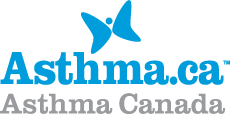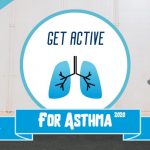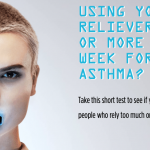1. Plan Ahead
Don’t let the heat and humidity catch you off guard — plan ahead! You can get ahead of the hot weather by checking the Pollen Count and your local Air Quality Health Index before going outdoors. If the pollen count is high and the air quality is poor, you may want to reschedule your plans and stick to indoor activities.
You also never know when you will encounter a seasonal asthma trigger that sets off your symptoms or an asthma attack, that’s why you should always carry your reliever medication. If you are a parent or caregiver to a child with asthma, make sure they know to carry their inhaler with them during summer activities such as playing sports, going to summer camp, hiking, or camping and that they have proper inhaler technique.
*Bonus tip: If you know you’re going to be out on hot days, make sure to keep your asthma medications out of direct sunlight and out of places that get especially hot like the glove compartment of your vehicle. Keep your medications close by and cool.
2. Stay Hydrated
The importance of staying hydrated and drinking lots of water cannot be stressed enough, this is especially true if you’re spending time in the scorching heat. To keep yourself hydrated and cool for longer, consider bringing a thermal water bottle with you on your errands. That way, your drink will stay reasonably cold while you’re on the go.
3. Pack Your Essentials
If you’re headed for some fun in the sun make sure you pack a few extra items to keep safe during our “new normal.”
Along with your sunglasses, water bottle and reliever medication, throw some hand sanitizer and a cloth mask into your bag to wear when you’re unable to maintain physical distancing. If it’s an especially hot day, try wearing your mask around the house for a few minutes to get used to how it feels. (*If you can’t wear without breathing difficulty – don’t wear one).
You can find more information about mask-wearing and general health recommendations here.
4. Avoid Peak Heat Times
If you have outdoor activities planned, it’s best to schedule them early in the morning or evening when temperatures are cooler and the air quality is better. This is especially important if you exercise outdoors. If you’re unable to alter your workout schedule and avoid the heat, make sure you pace yourself, reduce your level of exertion, and take frequent water breaks. You can learn more about exercising with asthma here.
5. Take Your Daily Asthma Medications
Asthma symptoms can flare up at unpredictable times, so you need to be prepared to manage them. As previously mentioned, having your reliever medication on hand at all times is extremely important and could save your life in case of an emergency. But it’s important not to solely rely on your reliever medication to manage your asthma (Find out if you are using your rescue inhaler too much with this short quiz).
You should also continue to take your daily controller medication as prescribed by your healthcare provider to treat the underlying inflammation in your airways. Using your controller will diminish your asthma symptoms long term and cut your risk of an asthma attack triggered by pollen or other common triggers.
We also recommended that you renew or refill your asthma medication prescriptions with a 30-day supply so that you’re well-equipped and prepared.
6. Have an Asthma Action Plan
Whether or not you have mild or Severe Asthma, having an Asthma Action Plan is crucial in helping you manage your asthma safely. It’s a personalized program that can be used to identify when your asthma is flaring up and the steps you need to take to manage it. You can download your free Asthma Action Plan template in either English or French here.
7. Stay Indoors on Humid Days
On humid days when it becomes extra difficult to breathe, it’s best to stay indoors to avoid pollen and poor air quality altogether, especially if you have asthma and allergies. Staying indoors will allow you to avoid your outdoor asthma triggers, reducing your chance of an asthma attack or flare-up.
If you have to go outside, make sure to take breaks in between activities by spending time in air-conditioned rooms, drinking water or having a refreshing treat like watermelon or lemonade to cool off.
8. Take Care of Yourself
Drinking lots of water is a must during the summertime, but adding plenty of rest and good nutritious food to the mix will keep you energized throughout the day. Taking care of yourself and staying healthy can also help alleviate intense emotions or anxiety that you may be feeling during these difficult times.
9. Contact our Asthma & Allergy HelpLine
If you need support or expert advice, you can reach out to one of our Certified Respiratory Educators (CREs) through our Asthma & Allergy HelpLine. They’re here to answer your most pressing questions about newly diagnosed asthma, managing asthma, avoiding triggers and treatment options. You can connect with one of our CREs today for personalized support by calling 1-866-787-4050 or emailing info@staging.asthma.ca.
10. Talk to Your Healthcare Team
If you find that you’re having trouble managing your asthma, consult with your healthcare provider or asthma specialist about your asthma treatment — they can discuss your treatment options with you and decide which one is right for you.
Heat and humidity can also trigger seasonal allergies due to prevalent allergens like pollen, dust and mould. If you have any concerns about your allergies, talk to your healthcare provider about having allergy testing done.
Whether you’re facing record-high temperatures or a sunny day by the water, these tips will help you manage your asthma symptoms and breathe easy all summer long and beyond. Take care and stay safe!






